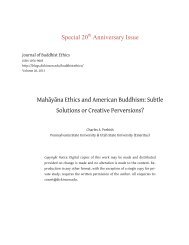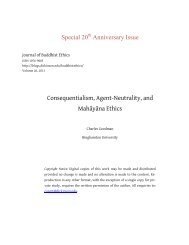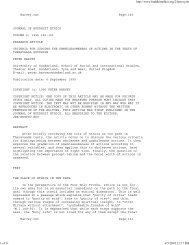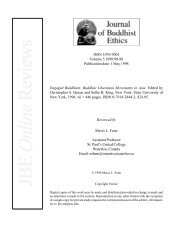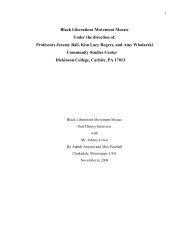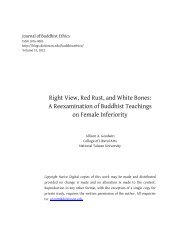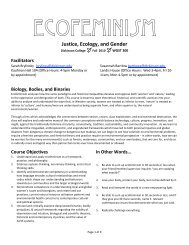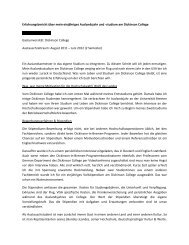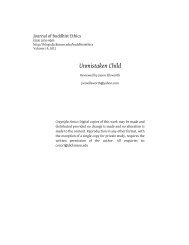Read article - Dickinson Blogs
Read article - Dickinson Blogs
Read article - Dickinson Blogs
Create successful ePaper yourself
Turn your PDF publications into a flip-book with our unique Google optimized e-Paper software.
Barstow, Between Abstinence and Indulgence 76<br />
practice religion not out of concern for their own suffering, but out of con-<br />
cern for the sufferings of others. In addition, practitioners are expected to<br />
put this compassionate orientation into practice, striving to relieve the suf-<br />
fering of all sentient beings—a category that explicitly includes animals—<br />
through both religious and worldly means.<br />
Concerns over the compatibility of this compassionate attitude<br />
with a meat-based diet arose early in the history of the Mahāyāna, and<br />
several early Mahāyāna texts contain explicit critiques of meat. Among<br />
these, the text most commonly cited by later Tibetan authors is the<br />
Laṅkāvatāra Sūtra, which D.T. Suzuki notes could have been composed<br />
no later than the third century (5). The Laṅkāvatāra Sūtra contains an en-<br />
tire chapter devoted to the flaws of meat, focusing on the contradiction<br />
between meat and the compassionate attitude a Mahāyāna practitioner<br />
should display. Ultimately, the text concludes, “Because they cultivate the<br />
idea that all beings are their only child, Bodhisattvas possess the nature of<br />
compassion and do not eat meat” (Shakyamuni lang kar gshegs pa’i mdo<br />
153b). 3 Despite these concerns, however, vegetarianism does not seem to<br />
have become normative in Indian Buddhism. The seventh century Chinese<br />
monk Yijing, in fact, returned to China after fifteen years in India and ex-<br />
plicitly reported that vegetarianism was not found in Indian Buddhist<br />
monasteries (Yijing 213.a06-213.a10; I-Tsing 58-59).<br />
Yijing’s emphasis on this point was likely prompted by the preva-<br />
lence of vegetarianism among his own contemporaries in China (Benn<br />
316). By the late seventh century, when Yijing was writing, vegetarianism<br />
had become normative for Chinese Buddhist monks (Kieschnick 201).<br />
Supported by a conviction that meat eating leads to a negative birth, vege-<br />
tarianism spread steadily in China and eventually all devout Buddhists,<br />
both monks and laity, would be expected to adhere to a meat free diet<br />
3 sems can thams cad la bu gcig gi 'du shes su bsgom pa'i phyir byang chub sems dpa' snying<br />
brtse ba'i bdag nyid can gyis sha thams cad mi bza'o/



